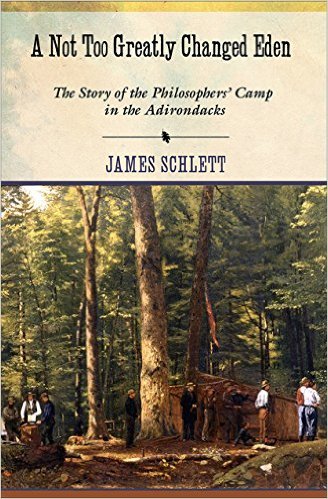

Purchase
A Not Too Greatly Changed Eden
James Schlett
The Story of the Philosophers' Camp in the Adirondacks
Cornell University Press
July 2015
On Sale: July 9, 2015
272 pages
ISBN: 0801453526
EAN: 9780801453526
Kindle: B011CY7H30
Hardcover / e-Book
Add to Wish List
Non-Fiction
In August 1858, William James Stillman, a painter and
founding editor of the acclaimed but short-lived art journal
The Crayon, organized a camping expedition for some of
America's preeminent intellectuals to Follensby Pond in the
Adirondacks. Dubbed the "Philosophers’ Camp," the trip
included the Swiss American scientist and Harvard College
professor Jean Louis Rodolphe Agassiz, the Republican lawyer
and future U.S. attorney general Ebenezer Rockwood Hoar, the
Cambridge poet James Russell Lowell, and the transcendental
philosopher Ralph Waldo Emerson, who would later pen a poem
about the experience. News that these cultured men were
living like “Sacs and Sioux” in the wilderness appeared in
newspapers across the nation and helped fuel a widespread
interest in exploring the Adirondacks.
In this book, James Schlett recounts the story of the
Philosophers’ Camp, from the lives and careers of—and
friendships and frictions among—the participants to the
extensive preparations for the expedition and the
several-day encampment to its lasting legacy. Schlett’s
account is a sweeping tale that provides vistas of the
dramatically changing landscapes of the United States in the
second half of the nineteenth century. As he relates, the
scholars later formed an Adirondack Club that set out to
establish a permanent encampment at nearby Ampersand Pond.
Their plans, however, were dashed amid the outbreak of the
Civil War and the advancement of civilization into a
wilderness that Stillman described as “a not too greatly
changed Eden.” But the Adirondacks were indeed changing.
When Stillman returned to the site of the Philosophers’ Camp
in 1884, he found the woods around Follensby had been
disfigured by tourists. Development, industrialization, and
commercialization had transformed the Adirondack wilderness
as they would nearly every other aspect of the American
landscape. Such devastation would later inspire
conservationists to establish Adirondack Park in 1892. At
the close of the book, Schlett looks at the preservation of
Follensby Pond, now protected by the Nature Conservancy, and
the camp site’s potential integration into the Adirondack
Forest Preserve.
Comments
No comments posted.
Registered users may leave comments.
Log in or register now!
| 


 © 2003-2025 off-the-edge.net
all rights reserved Privacy Policy
© 2003-2025 off-the-edge.net
all rights reserved Privacy Policy